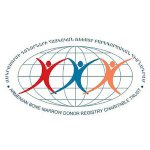Marrow Donor Day in Armenia Date in the current year: January 8, 2026
 Marrow Donor Day in Armenia is celebrated annually on January 8. It is dedicated to all the people who voluntarily donate their blood for HLA testing, register as potential bone marrow donors, and donate their hematopoietic stem cells if they turn out a match for a potential recipient.
Marrow Donor Day in Armenia is celebrated annually on January 8. It is dedicated to all the people who voluntarily donate their blood for HLA testing, register as potential bone marrow donors, and donate their hematopoietic stem cells if they turn out a match for a potential recipient.Bone marrow is the most common source of hematopoietic stem cells (HSCs) that give rise to all cellular blood components (erythrocytes, lymphocytes, granulocytes, etc.); this process is known as haematopoiesis. Our body produces more than 500 billion blood cells daily in order to function normally. However, the bone marrow of people with certain health conditions doesn’t produce enough HSCs for normal haematopoiesis.
In the mid-20th century, scientists came up with the idea of transplanting bone marrow-derived stem cells from healthy donors to help patients with certain conditions, such as hematopoietic cancers, certain types of anemia, metabolic disorders and autoimmune diseases, and some other health conditions.
One of the main problems with bone marrow transplantation is that it is be very hard to find a suitable donor. For example, blood compatibility is determined by two main criteria: the ABO blood type and the Rh blood type. Bone marrow compatibility is much more complicated; the matching donor must have a compatible human leukocyte antigen (HLA) type, and the variety of those is bigger than the number of blood types.
A sibling is most likely to be a bone marrow match for a patient, but even among siblings, the chance of compatibility is only about 25%. Therefore, most patients in need of bone marrow transplantation have to seek an unrelated donor. To help patients find compatible donors, bone marrow registries were created.
A bone marrow registry is a database of potential marrow donors. People give blood for HLA typing and give their consent for their information to be added to the registry. If a person turns out a potential match, they are contacted by a registry representative to check whether they are still willing to donate.
There are two main types of bone marrow registries: global and national. The development of national registries is very important for a number of reasons. First, race and ethnicity play a major role in donor compatibility, so there is usually a higher chance of finding a suitable donor in one’s home country, unless the patient doesn’t belong to an ethnic minority. Second, the costs are lower if the patient and the donor are from the same country (although donors are never paid, there are medical and non-medical costs associated with the procedure that need to be covered).
Taking this into account, Armenian activists founded the Armenian Bone Marrow Donor Registry on January 8, 2000. Since it is nearly impossible for Armenians to find suitable matches in international registries due to their unique genetic make-up, the Armenian Bone Marrow Donor Registry strives to help ethnic Armenians find unrelated marrow donors. Its foundation anniversary is observed in Armenia as National Marrow Donor Day.
- Category
- Other Observances
- Country
- Armenia
- Tags
- Marrow Donor Day in Armenia, holidays in Armenia, Armenian Bone Marrow Donor Registry, bone marrow transplantation